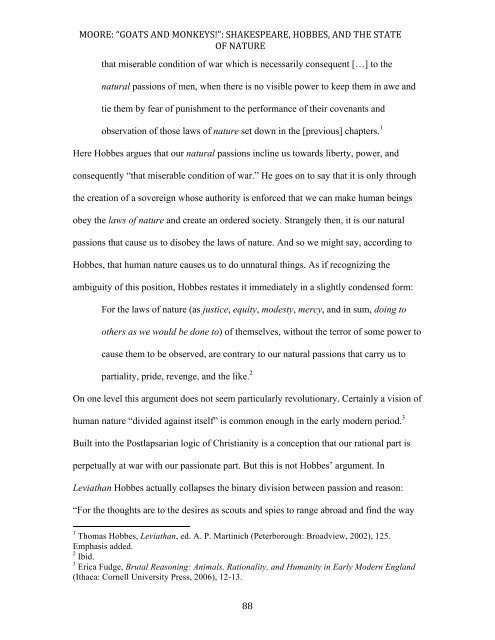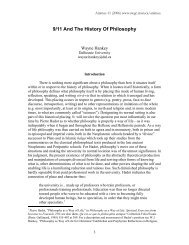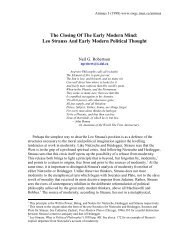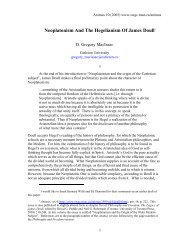âgoats and monkeys!â: shakespeare, hobbes, and the state of nature
âgoats and monkeys!â: shakespeare, hobbes, and the state of nature
âgoats and monkeys!â: shakespeare, hobbes, and the state of nature
You also want an ePaper? Increase the reach of your titles
YUMPU automatically turns print PDFs into web optimized ePapers that Google loves.
MOORE: “GOATS AND MONKEYS!”: SHAKESPEARE, HOBBES, AND THE STATE <br />
OF NATURE <br />
that miserable condition <strong>of</strong> war which is necessarily consequent […] to <strong>the</strong><br />
natural passions <strong>of</strong> men, when <strong>the</strong>re is no visible power to keep <strong>the</strong>m in awe <strong>and</strong><br />
tie <strong>the</strong>m by fear <strong>of</strong> punishment to <strong>the</strong> performance <strong>of</strong> <strong>the</strong>ir covenants <strong>and</strong><br />
observation <strong>of</strong> those laws <strong>of</strong> <strong>nature</strong> set down in <strong>the</strong> [previous] chapters. 1<br />
Here Hobbes argues that our natural passions incline us towards liberty, power, <strong>and</strong><br />
consequently “that miserable condition <strong>of</strong> war.” He goes on to say that it is only through<br />
<strong>the</strong> creation <strong>of</strong> a sovereign whose authority is enforced that we can make human beings<br />
obey <strong>the</strong> laws <strong>of</strong> <strong>nature</strong> <strong>and</strong> create an ordered society. Strangely <strong>the</strong>n, it is our natural<br />
passions that cause us to disobey <strong>the</strong> laws <strong>of</strong> <strong>nature</strong>. And so we might say, according to<br />
Hobbes, that human <strong>nature</strong> causes us to do unnatural things. As if recognizing <strong>the</strong><br />
ambiguity <strong>of</strong> this position, Hobbes re<strong>state</strong>s it immediately in a slightly condensed form:<br />
For <strong>the</strong> laws <strong>of</strong> <strong>nature</strong> (as justice, equity, modesty, mercy, <strong>and</strong> in sum, doing to<br />
o<strong>the</strong>rs as we would be done to) <strong>of</strong> <strong>the</strong>mselves, without <strong>the</strong> terror <strong>of</strong> some power to<br />
cause <strong>the</strong>m to be observed, are contrary to our natural passions that carry us to<br />
partiality, pride, revenge, <strong>and</strong> <strong>the</strong> like. 2<br />
On one level this argument does not seem particularly revolutionary. Certainly a vision <strong>of</strong><br />
human <strong>nature</strong> “divided against itself” is common enough in <strong>the</strong> early modern period. 3<br />
Built into <strong>the</strong> Postlapsarian logic <strong>of</strong> Christianity is a conception that our rational part is<br />
perpetually at war with our passionate part. But this is not Hobbes’ argument. In<br />
Leviathan Hobbes actually collapses <strong>the</strong> binary division between passion <strong>and</strong> reason:<br />
“For <strong>the</strong> thoughts are to <strong>the</strong> desires as scouts <strong>and</strong> spies to range abroad <strong>and</strong> find <strong>the</strong> way<br />
1 Thomas Hobbes, Leviathan, ed. A. P. Martinich (Peterborough: Broadview, 2002), 125.<br />
Emphasis added.<br />
2 Ibid.<br />
3 Erica Fudge, Brutal Reasoning: Animals, Rationality, <strong>and</strong> Humanity in Early Modern Engl<strong>and</strong><br />
(Ithaca: Cornell University Press, 2006), 12-13.<br />
88
















